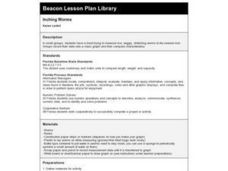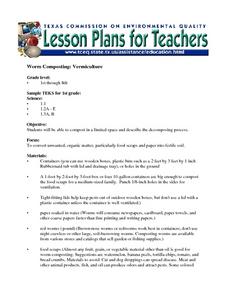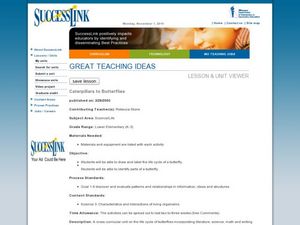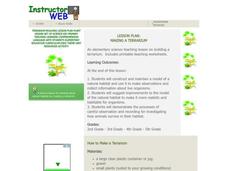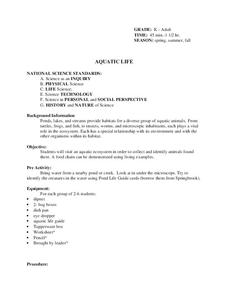Curated OER
Inching Worms
Third graders have a blast trying to measure live, wiggly, stretching worms to the nearest inch. Groups record their data onto a class graph and then compare characteristics. They share their findings with the rest of the class. Fun...
Captain Planet Foundation
Shape Shifters in the Math Garden
Combines mathematical measurement with gardening skills. Third graders hunt for worms in the garden and try to find the longest one. They also measure and weigh vegetables that they harvest from the garden, measure rainfall amounts, and...
Curated OER
Inch By Inch
Students explore the concept of measuring length using a one-inch pipe cleaner "inchworm." They listen to the story "Inch By Inch by Leo Lionni and discuss how the animals were measured by the inchworm in the book. In pairs students...
Curated OER
Composting With Worms
Third graders predict what happen in two (control and experiment) containers -- one with soil and trash, the other with soil, trash, and worms.
Curated OER
Causal Patterns in Ecosystems Section 3
Students design and create a worm and worm free compost tanks for observation of decay in ecosystems. They make predictions, care, and revist tanks using their journals for observation and data collection.
NOAA
Animals of the Fire Ice
When the sun's rays can't reach the producers in a food web, where does all the energy come from? Extreme environments call for extreme food sources. Young scientists investigate creatures that appear to get their energy from methane...
Curated OER
More Bait for Your Buck!
Students determine where to buy the heaviest earthworms as they study invertebrates. They create a double bar graph of the results of the weight data.
Curated OER
Worm Composting: Vermiculture
Students set up their own composting bin. They observe and record their findings during a period of time. They describe the decomposing process as well.
Curated OER
Worming Your Way Through the Soil
Students study soil, living and non-living particles in the soil, and learn about composting. In this soil study lesson, students study soil samples and discuss the living and non-living components of the soil. Students classify the...
Curated OER
Worm Composting: Vermiculture
Students compost in a limited space and describe the decomposing process. Students convert unwanted, organic matter, particularly food scraps and paper into fertile soil.
Curated OER
Working Worms
Learners study earthworms and their role in creating healthy soil for healthy food. In this earthworms and soil lesson, students complete an jug experiment to learn about the role of earthworms and healthy soil. Learners read and discuss...
Curated OER
Investigating the Behavior of Lumbriculus
Students perform a classroom experiment on the organisms of worms. They view the behaviors of the worms and analyze their results. This instructional activity introduces students to the techniques involved in behavioral studies.
Curated OER
Collecting Compost
Students observe a composting box. In this soil lesson, students create a composting bin by using a bin, newspaper, worms, and food scraps. Students create a composting food web.
Curated OER
Nutrients Nutrients We Need
Second graders examine the six nutrients humans need to maintain good heath. For this ecosystem lesson, 2nd graders learn about how plants grow and compare how humans need nutrients from plants to how plants need nutrients from the soil....
Curated OER
"Caterpillars to Butterflies"
Students participate in a variety of activities about how caterpillers become butterflies.
Curated OER
Facts on Fish Species
Here is a brief outline of facts on various Chesapeake Bay fish species. Use it as an example of what kind of information you want your life science learners to collect when you assign them a specific species to research. Another way to...
Curated OER
Making a Terrarium
Students construct and maintain model of natural habitat, suggest improvements to the model of the natural habitat to make it more realistic and habitable, and demonstrate careful observation and recording of how animals survive in their...
Curated OER
A Tail to Tell
Students observe populations of Lumbriculus to discover some of the adaptations that allow them to live successfully along the shores of ponds and marshes. They also design and perform experiments to test proposed hypotheses for these...
Curated OER
Ocean Exploration
Learners explore a simulated ocean floor. In this environmental lesson plan, students take on roles of an ocean dive team exploring the ocean floor. Dive logs will be created and the learners will explore their sections of simulated...
Curated OER
Edible Soil
Students examine the components of the soil in their community. Following directions, they create their own edible soil to be eaten at the end of the activity. They discuss what makes soils around the world different from those found...
Curated OER
What Structures and Behaviours Can Be Observed in Vinegar Eels?
Students view vinegar eels under a microscope at different magnifications. They use a DigiScope with the camera attachment in place of the eyepiece. Students count the number of thrashing movements in 10 seconds. They repeat this three...
Curated OER
Edible Soil
Young scholars model the soils layers using Oreo's. In this lesson students use their favorite food items to create a model of soil layers. A discovery lesson from a youth camp is adapted for classroom modeling and discussion of soil...
Curated OER
Aquatic Life
Students explore aquatic life. In this science lesson, students visit an aquatic ecosystem and collect animals found there. Students create a food chain for the aquatic ecosystem.
Curated OER
Think Green
Students experience and practice compositing and recycling through hands-on-activities. They distinguish between which items from their trash can be recycled, composted and reused. The process for making recycled paper is also covered in...


